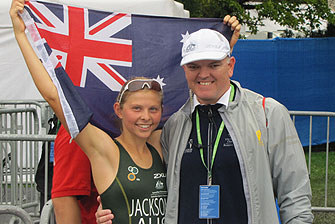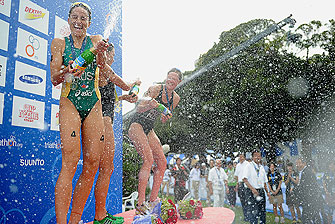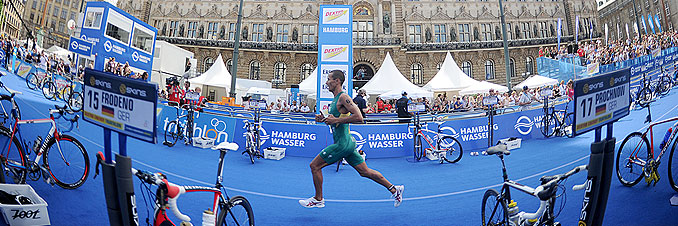TRIATHLON AUSTRALIA IN SEARCH FOR NEXT OLYMPIC CHAMPIONS
TRIATHLON, September 22: Triathlon Australia has today launched
an exciting nation-wide search for future Olympic champions in what has
been described as “the most significant development concept the sport
has ever undertaken.”
Four internationally successful, high profile coaches have been
appointed as Australia’s new State Talent Coaches (STC) to start the
search and develop a pathway for the development of athletes (aged 14-17
years).
Triathlon Australia with the State Associations will target these athletes for 2016 and primarily the 2020 Olympic Games in what will be an extensive State Talent Academies (STA) program, divided into four specific regions.
 |
 |
The four State Talent Coaches and their specific regions are:
Craig Walton (Queensland and Northern Territory): The Sydney 2000 Olympian, Olympic gold medal coach and AIS Coach of the Year.
Keiran Barry (NSW/ACT) who coached his partner Nicole Hackett to the 2000 World Championship in Perth and onto the 2000 Sydney Olympic team.
Chris Lang (WA), the respected former Gold Coast-based coach of Brad Kahlefeldt who will re-locate to head up the WA program.
Jan Rehula (VIC/TAS/SA) The Sydney 2000 Olympic bronze medallist and current Korean National Team coach from the Czech Republic.
The Australian Sports Commission funded program has been 18 months in the making and will see the creation of a “camps-based program” alongside a home training environment with their home coaches.
The STA will target athletes who are four to seven years away from international elite triathlon careers.
It will provide the “new discoveries” with a pathway from the State Junior Development programs to the State Institute and Academy programs (SIS/SAS).
They will then progress into Triathlon Australia’s High Performance program, including the AIS Triathlon program - the pathway on to the international stage.
Triathlon Australia’s National Performance Director, Michael Flynn is excited about the new direction for the sport and believes that the timing should boost the potential for Australia to maintain its standing as one of the premier countries in International triathlon for the future.
The recent World Championship Series and Beijing Grand Final has seen Great Britain take over the dominance of the sport.
Outstanding “triathlete of the moment” Alistair Brownlee and brother Jonny Brownlee took the World Championship pointscore quinella in the Elite men after Alistair won the Grand Final.
Fellow Brit Helen Jenkins was also crowned overall women’s world champion and the Brits also filled the first three placegetters in the under 23 men’s event.
“Australia has a great history in triathlon, statistically the best of any country with 40 percent of the total elite medals won at a World Championship level won by Australians,” said Flynn.
“But we just can’t rely on the same pathways of development that we have done over the years, we have to be more proactive and become competitive in the search for the next generation of talented youngsters who we can take to the Olympic Games and ITU World Championships.
“The International competitive arena has changed and Australia needs to be proactive about moving forward with this change or be left behind.
“We will be looking at swimmers, cyclists and runners from the age of 14 and above and with their coaches develop those athletes and coaches to find the next “Emma”, Brad Kahlefeldt or Chris McCormack.

“Athletes who may start as good young cross country runners and end up being a champion at the Olympic, Sprint, Half Ironman or Ironman distances like “Macca” who has been successful across all disciplines. Triathlon Australia’s priority is the ITU World Championship events and in particular the Olympic Games events but who knows where athletes will end up.
“It’s actually a similar path to how Emma Jackson was discovered by Queensland coach Stephen Moss in the Queensland State Cross Country Championships and look where she is now – fourth overall in this year’s ITU World Championships in her first year out of the junior age group.
“I believe the STA program will be the most successful development concept the sport has ever undertaken and we may need to look at this type of program separately for females and males.
“In saying that we should also be looking at developing coaches who can coach both males and females to international success.”